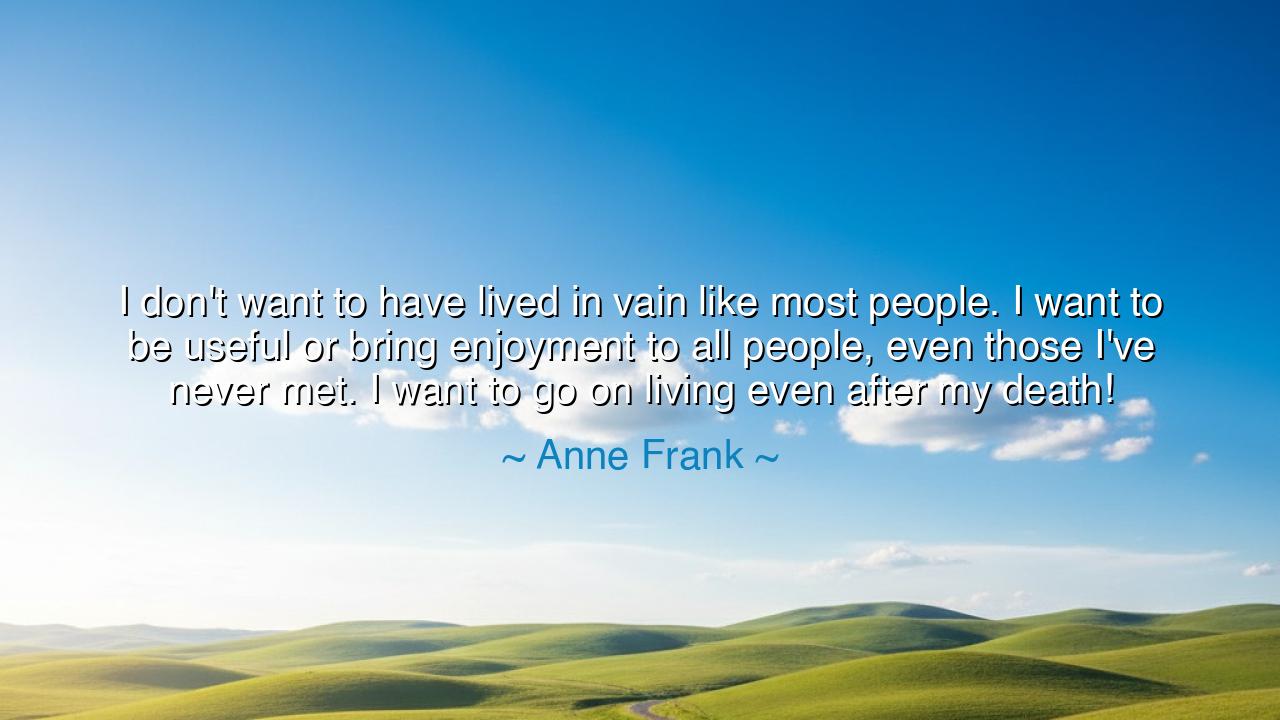
I don't want to have lived in vain like most people. I want to be
I don't want to have lived in vain like most people. I want to be useful or bring enjoyment to all people, even those I've never met. I want to go on living even after my death!






“I don't want to have lived in vain like most people. I want to be useful or bring enjoyment to all people, even those I've never met. I want to go on living even after my death!” So wrote Anne Frank, a young girl hidden away in the shadow of one of history’s darkest hours. Though her body was confined, her spirit soared beyond the walls of the secret annex. Her words, penned in fear yet lit by faith, shine like a lantern across the ages. In them we hear the cry of a soul that refuses to be erased—a soul that seeks not survival alone, but meaning, purpose, and immortality through goodness.
In this quote, Anne Frank speaks the eternal language of the human heart—the yearning to live a life that matters. To live in vain, she says, is to pass through the world like a shadow, to breathe but never inspire, to exist without leaving a trace of light behind. But she, though young and surrounded by the terror of death, longed to be useful, to bring joy even to strangers she would never know. Her words carry the ancient wisdom of the prophets and poets, who understood that the true measure of a life is not its length, but its legacy. She reminds us that immortality is not granted by kings or monuments, but earned through compassion, courage, and truth.
Anne wrote these lines while in hiding from the Nazi persecution, when every day brought the threat of discovery, imprisonment, and death. Yet she did not dwell only on fear. Instead, she lifted her eyes toward eternity. She wanted to go on living even after her death—not through fame or wealth, but through the enduring power of kindness and creation. In her diary, she built a world of thought and feeling that outlived her own fragile body. Her words became her wings. And though she perished in the darkness of a concentration camp, her spirit, through those pages, continues to breathe, to comfort, to inspire millions.
In this way, her dream became reality. What Anne Frank longed for has come to pass. The little girl who hid from the world now speaks to the entire world. Her diary, written with the simplicity of youth and the insight of a sage, is now read in dozens of languages. She has indeed gone on living after her death—not as a symbol of tragedy alone, but as a voice of radiant hope. She stands among the great teachers of humanity, proving that even in the midst of cruelty and despair, a single honest heart can kindle eternal light.
Her words remind us of the timeless truth known to the ancients: that to be useful is the highest calling, and to bring joy to others is the surest path to immortality. The philosopher Marcus Aurelius wrote in his meditations, “What does not benefit the hive, does not benefit the bee.” Anne, though she may never have read those words, lived their spirit. Her desire was not selfish glory, but service—to give something of herself to others, to sweeten the lives of those who came after her. In this, she achieved what even emperors rarely do: the victory of the soul over oblivion.
But there is a deeper current within her words, a challenge to all who live today. For she warns us against the great tragedy of living in vain—of spending our brief years chasing comfort, wealth, or distraction, instead of meaning. She calls us to awaken, to act, to create, to love—to give something beautiful back to the world that sustains us. She teaches that to live well is not to escape pain, but to transform it into compassion; not to seek applause, but to leave behind kindness that outlasts our own heartbeat.
So, my friends, learn from her. Do not wait for the world to grant you greatness; plant it within yourself. Be useful in your own small way. Bring joy where there is sorrow. Speak truth where there is silence. Write, build, teach, forgive, love—these are the immortal acts that echo through eternity. For in the end, to go on living after death is not a miracle reserved for the few. It is a choice, made daily, by every soul who dares to live with purpose.
And thus, Anne Frank—though her life was brief—became deathless. Her name endures not because she lived long, but because she lived deeply, with faith in humanity even when humanity failed her. She reminds us that even in the darkest night, one heart lit by hope can outshine the grave. To follow her example is to live so that, when we too are gone, our words, our deeds, our kindness may whisper to those yet unborn: “I am still here. I still believe in the goodness of people.”






AAdministratorAdministrator
Welcome, honored guests. Please leave a comment, we will respond soon